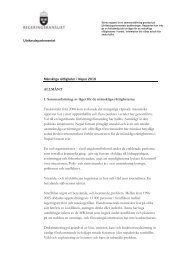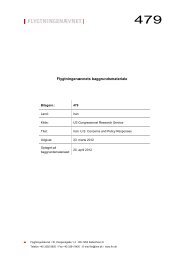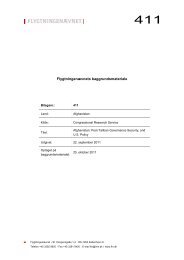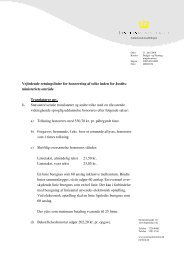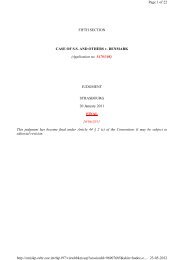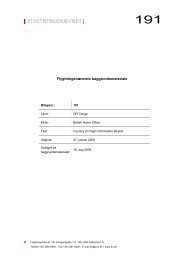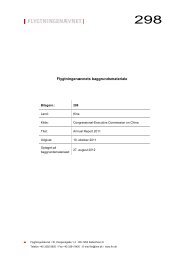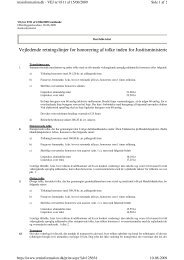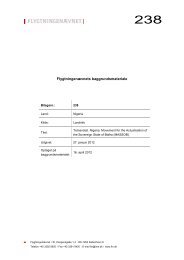Annual Report - National Human Rights Commission
Annual Report - National Human Rights Commission
Annual Report - National Human Rights Commission
Create successful ePaper yourself
Turn your PDF publications into a flip-book with our unique Google optimized e-Paper software.
Complaints Before the <strong>Commission</strong><br />
○ ○ ○ ○ ○ ○ ○ ○ ○ ○ ○ ○ ○ ○ ○ ○ ○ ○ ○ ○ ○ ○ ○ ○ ○ ○ ○ ○ ○ ○ ○ ○ ○ ○ ○ ○ ○ ○ ○ ○ ○ ○ ○ ○ ○ ○ ○ ○ ○ ○ ○ ○ ○ ○ ○ ○ ○ ○ ○ ○ ○<br />
○<br />
Singh was now in a stable condition and could be shifted to Jan Kalyan Trust, an old age home<br />
at Noida where appropriate arrangement had been made. However, the trust later backed out<br />
from their commitment. While the matter stood thus, for the sake of the protection of human<br />
rights of the mentally ill prisoner, and in the light of the directions by the High Court, the<br />
<strong>Commission</strong> moved a Criminal Writ Petition No. 1278/04 before the High Court of Delhi and<br />
prayed for quashing of the trial of Charanjeet Singh whose condition had deteriorated despite<br />
prolong treatment at various hospitals/ institutions.<br />
4.183 During the course of hearing the High Court requested the <strong>Commission</strong> to suggest<br />
guidelines to ameliorate the hardships faced by accused persons of unsound mind, and to ensure<br />
that their human rights are respected. The <strong>Commission</strong> accordingly submitted draft guidelines to<br />
be followed by all officials concerned. The High Court, while observing that it had become<br />
clear that the undertrial prisoner cannot be tried as there was no chance of reversal of his<br />
deteriorating mental and physical condition and no scope of improvement in his condition, quashed<br />
the charge sheet against Shri Charanjeet Singh.<br />
4.184 The High Court commended the role played by the <strong>Commission</strong> in taking up the case of<br />
desolate and destitute person Charanjeet Singh as well as the framing of the guidelines to be<br />
followed in such cases. It appreciated the positive response by the Government. of NCT of<br />
Delhi and directed the State Government to prepare necessary schemes for rehabilitation of<br />
released mentally ill persons, within three months and also to take steps for establishment of half<br />
way homes for such destitute people taking into account the guidelines suggested by the<br />
<strong>Commission</strong> which are reproduced below :-<br />
i) Psychological or psychiatric counselling should be provided to prisoners as required in<br />
order to prevent mental illness and/or to ensure early detection. Collaborations of this<br />
purpose should be made with local psychiatric and medical institutions as well as with<br />
NGOs.<br />
ii)<br />
iii)<br />
iv)<br />
Central and District jails should have facilities for preliminary treatment of mental disorders.<br />
Sub-jails should take inmates with mental illness to visiting psychiatric facilities. All jails<br />
should be normally affiliated to a mental hospital.<br />
Every central and district prison should have the services of a qualified psychiatrist who<br />
should be assisted by a psychologist and a psychiatric social worker.<br />
Not a single mentally ill person who is not accused with committing a crime should be<br />
kept in or sent to prison. Such people should be taken for observation to the nearest<br />
psychiatric centre, or if that is not available to the Primary Health Centre.<br />
v) If an undertrial or a convict undergoing sentence becomes mentally ill while in prison, the<br />
<strong>National</strong> <strong>Human</strong> <strong>Rights</strong> <strong>Commission</strong> <strong>Annual</strong> <strong>Report</strong> - 2004-2005<br />
63<br />
AR-Chapter-1-19-10-6-06.p65<br />
83<br />
7/17/06, 6:29 PM



